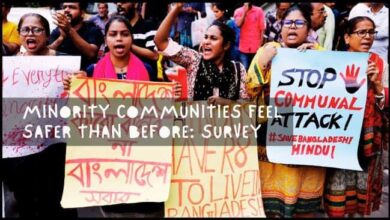Journalist Moinuddin Kaderi: Nurul Absar Chowdhury Fought Fascism, Championed Democracy
Speakers at Chattogram memorial recall his political legacy and call for a city road to be named in his honor.

“Nurul Absar Chowdhury practiced democratic politics in defiance of fascism. Individuals like him are rare in today’s society,” said veteran journalist Moinuddin Kaderi at a memorial and prayer event held on Thursday (July 31) at the Lusai Hall of Lusai Bhaban, Cheragi Pahar, organized by Green Global Fellowship.
Kaderi, a former member of the World Press Council and Bangladesh Press Council, and chief advisor of Chattogram Editors’ Club, added,
“For the past 53 years, Bangladesh’s governance has shown consistent democratic deficits, eventually giving rise to fascist rule. Citizens, political parties, and students all aspire to build a truly democratic state—one where people no longer face enforced disappearances, extrajudicial killings, or repression. We must all remain vigilant against these threats.”
He further emphasized the urgent need for principled figures like Nurul Absar Chowdhury in today’s political climate and demanded that a major road in Chattogram be named after him.
Kaderi added, “Those who oppress people will eventually face divine punishment. We must live by Allah’s laws and show compassion to others. Those who support humanity will receive divine rewards. Nurul Absar Chowdhury devoted himself to easing human suffering. Following in his footsteps would benefit society as a whole.”
The event was chaired by Green Global Fellowship chairman Kamrul Huda.
Legacy Remembered by His Son:
Engineer Md. Javed Absar Chowdhury, eldest son of Nurul Absar Chowdhury, highlighted his father’s significant contributions to politics, education, and social welfare.
During Pakistan’s era, Nurul Absar Chowdhury served as General Secretary of the Chattogram District Student Federation. He played vital roles in key political movements, including the 1962 protests against the education commission, the 1964 campaign for universal voting rights, and the 1969 mass uprising. He also actively supported the 1971 Liberation War.
Chowdhury later became President of the Chattogram Metropolitan Democratic League and advisor to the Chattogram City Corporation. He was deeply involved in several institutions such as the Islamabad Town Co-operative Credit Society, Anjuman-e-Rahmania Ahmadia Sunnia, Chattogram Maa O Shihu Hospital, and the Chattogram Diabetic General Hospital.
Speakers Demand Road Naming:
Various prominent speakers said that Nurul Absar Chowdhury’s legacy deserves permanent recognition in Chattogram’s history. They urged the city mayor, Dr. Shahadat Hossain, to name a major road in his honor.
Other Speakers Included:
Advocate M. Abul Abbas Kaderi, Dream Journey Organization Secretary Md. Rakib Uddin Chowdhury, Naya Bangla editor Ziauddin M. Enayet Ullah, Manik Rasul Md. Raisu of A.R. Rahman Group, Advocate Abdul Gafur, S.M. Saiful Wadud, Md. Masud Rana, Rafiqul Islam, Md. Gias Uddin, Md. Masud Parvez, S.M. Ziaur Rahman, Mobarak Hossain Bhuiyan of Dainik Arthoniti, Mohammad Iqbal, journalists M. Hossain and Tanvir, July war veteran Maulana Osman Qasemi, Maulana Abdu Sobhan, Md. Mohin, Ariful Akbar, and Theater Institute’s Ripon Kumar Barua, among others.




